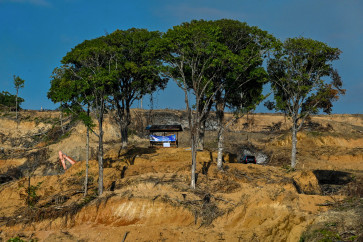Popular Reads
Top Results
Can't find what you're looking for?
View all search resultsPopular Reads
Top Results
Can't find what you're looking for?
View all search resultsAnalysts excited by Asia's rising power but warn of economic and political downside risks
Asian economy: Asian Giants discussed by (from left to right) moderator Martin Soong, Tommy Koh, Jusuf Wanandi, Duvvurii Subbarao and Li Mingjiang at the DBS Asian Insights Conference
Change text size
Gift Premium Articles
to Anyone
 Asian economy: Asian Giants discussed by (from left to right) moderator Martin Soong, Tommy Koh, Jusuf Wanandi, Duvvurii Subbarao and Li Mingjiang at the DBS Asian Insights Conference. (Courtesy of DBS) (from left to right) moderator Martin Soong, Tommy Koh, Jusuf Wanandi, Duvvurii Subbarao and Li Mingjiang at the DBS Asian Insights Conference. (Courtesy of DBS)
Asian economy: Asian Giants discussed by (from left to right) moderator Martin Soong, Tommy Koh, Jusuf Wanandi, Duvvurii Subbarao and Li Mingjiang at the DBS Asian Insights Conference. (Courtesy of DBS) (from left to right) moderator Martin Soong, Tommy Koh, Jusuf Wanandi, Duvvurii Subbarao and Li Mingjiang at the DBS Asian Insights Conference. (Courtesy of DBS)
A
span class="caption">Asian economy: Asian Giants discussed by (from left to right) moderator Martin Soong, Tommy Koh, Jusuf Wanandi, Duvvurii Subbarao and Li Mingjiang at the DBS Asian Insights Conference. (Courtesy of DBS)
Asia's regional experts are quite excited about the continued robust growth of the Asian economy as the economic gravity has moved from the West to the East but warned of several political and economic downside risks that could lead many countries in the region into the middle-income trap.
Bank DBS Chief Executive Officer Piyush Gupta and chief economist David Carbon briefed the around 500 businesspeople and analysts attending the DBS Asian Insights Conference here on Friday on how the rising power of Asian giants (notably China, India and Indonesia) would change the structure of the global economy.
Even after the growth in China now has declined to about 7.6 percent and the expansion in India and Indonesia has also moderated Asia (excluding Japan) would still put three Eurozoes (in economic size) on the global economic map within 25 years, Carbon noted at the first plenary session on Asian giants.
'Asia (excluding Japan) with a combined gross domestic product of US$16 trillion, or about similar to the US economy will continue to be the main locomotive of the world economy,' Carbon added.
However, the four panelists at the session warned that political divisiveness, indequate pace of reform measures and inequality in income distribution and asset ownership could stifle the growth and lead Asian major economies into a middle-income trap.
Two of the paneliss, Jusuf Wanandi, co-chair of the Pacific Economic Cooperation Council (PECC), and Tommy Koh, Singapore's Ambassador at Large, cited the tensions between China, now the world's second largest economy, and its neighbors over South China Sea as a major political downside risk to sustainable growth in the region.
'Indonesia has been enjoying good relations with China and our bilateral economic ties have been quite strong, but China seems to have been more assertive now with its rising power,' Wanandi said.
'How China with its rising economic power will behave towards its neighbors will impact on the future economic growth and integration in the egion,' Koh pointed out.
The two other panelists, Duvvuri Subbarao, former governor of the Reserve of India, and Li Mingjiang, coordinator of the China Program at the S. Rajaratnam School of International Relations pointed to the need for a continued high pace of structural reform in Asia, otherwise many major economies in the region would remain trapped in the middle-income club.
Subbarao and Mingjiang shared the views that Asian high growth would be sustainable only if reform and infrastructure deveopment would be accelerated and clean governance strengthened.
The plenary session was supposed to focus on the economic issues related to the Asian giants but participants at the meeting and journalists at a later news conference bombarded Wanandi with questions about the upcoming presidential elections in Indonesia and how the outcome would impact on future economic policies.
'To be honest with you I am a partisan supporter of Jokowi (presidential candidate Joko 'Jokowi' Widodo), so please be critical on what I said. But the reality is I don't want authoritarian rule back in my country,' Wanandi asserted.
He said the development concepts of both candidates are strikingly different. While presidential candidate Prabowo Subianto aspires to restore authoritarian rule as that under Soeharto, Jokowi has strongly been committed to strengthening the democracy process.
'The most pressing problem now is how to prevent cheating in the voting, without which Prabowo will never win,' Wanandi added.









